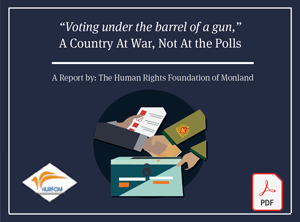“Rehabilitation and Reintegration” for Victims, but Justice Remains Elusive
June 12, 2012
In the past, before U Thein Sein was in power and the government and armed ethnic groups reached ceasefire agreements, thousands of innocent ethnic people in several border regions suffered severely from gross human right violations. Relatives were lost to violent conflict, women were plagued by sexual assaults, and villagers saw their lands and properties seized due to widespread land confiscation.
Now, attempts are being made at restoring social balance. Thanks to the Norwegian Peace Initiative, “rehabilitation and reintegration” projects are being developed to support displaced ethnic people and to acknowledge their dignity as individuals. Additionally, Buddhist and Christian teachings affirm that victims of human rights abuses can forget ill treatment and forgive perpetrators, the latter being “pardoned” because violations occurred in wartime. In these ways, sufferers can heal their wounds.
But these solutions may not bring comfort to all victims. Many still recall what happened to their families—husbands and wives, sons and daughters—in the past. A heavy question mark is anchored in their hearts: how could the Burmese soldiers be so merciless and cruel when they, too, have parents, children, brothers and sisters?
Similarly, many families who were forcibly displaced or relocated without notice still hold on to the memories of their homes. They clearly recall what life was like when shared with close communities of friends and relatives. Can they reclaim their original homes and former lives? Who occupies the houses now? What happened to their farms? These questions remain rooted in the minds of displaced people.
Lands and their associated resources are the main assets to ensure the survival of ethnic people. When soldiers seize lands suddenly, the residents not only lose their homes, they also lose their specialized livelihoods and the regular income they depend on to support their families. These victims of displacement remember their homes, and they dream of returning.
In this context, without the additional process of “seeking justice,” rehabilitation and reintegration will not sufficiently heal past injuries or mend enduring wounds.
The Human Rights Foundation of Monland (HURFOM) and other human rights documentation organizations recommend that past human rights violations be directly addressed and that true social justice is sought.
Therefore, the current government led by President Thein Sein, the National League for Democracy (NLD), and the ethnic group leaders must jointly establish a “Truth and Reconciliation Commission” to acknowledge the dark history of the past and to ensure genuine justice for the victims of human rights abuses.
Comments
Got something to say?
You must be logged in to post a comment.




















































